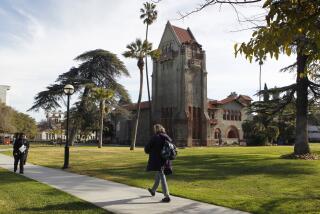70-Year-Old ‘Professor’ Hooks Students on Fishing
- Share via
The postcards keep coming for “the Professor.” “Tony, Sorry I had to drop out of sight, but I had business in Utah.”
“Dear Professor, I’m the guy you sent to hell on the (boat) Bold Contender. Not really. It’s not so bad.”
“Tony, Just a note to let you know I’m doing fine. I was stupid for dropping out of your class, but we all got to make a buck, right?”
In all, about 35 postcards from former students crowd the bulletin board in Tony (the Professor) Barcott’s classroom on the second floor of the Fisherman’s Cooperative building at Berth 73 in San Pedro.
There, Barcott, the 70-year-old fisherman-turned-teacher, still conducts his class in commercial fishing, passing along techniques he learned from 50 years in the trade. Since the 12-week class was first offered 13 years ago by the Harbor Occupational Center, Barcott estimates that 1,500 students, including 12 women, have completed the course.
One recent morning, Barcott, who earned his nickname after getting his high school diploma at adult night school, began class at 8:30 a.m. A huge, tattered net was spread across the classroom floor and three students watched and listened as Barcott demonstrated the proper methods of mending it.
Taking a break a few minutes later, Barcott explained to a visitor that as the size of the local fishing fleet has dwindled in recent years, so has the size of his class. At present, there are about 20 students officially enrolled in the class, down dramatically from past years.
“There used to be . . . 75 to 100 in class at a time,” Barcott said, “but with the canneries going out of business and the fishing bad, it’s dropped. And people can see there is no future in tuna fishing. Now they want to be longshoremen.”
That doesn’t hold true for class member Troy Chavez, a 17-year-old junior at San Pedro High School. Chavez said he has worked on fishing boats since he was 10 and hopes to become a full-time fisherman when he finishes school. “My dad owns his own auto body shop, but I don’t want to do that,” Chavez said. “I want to fish.”
Another student, Terry Aguiar, said he was an experienced fisherman. The 37-year-old native of Hawaii explained that he had moved to the mainland about a year ago to search for work. “I just needed a change from Hawaii,” Aguiar said. “I was walking around the waterfront and some people told me about Tony, so I decided to check out the class.”
Over mid-morning coffee at Canelli’s, a cafe frequented by local skippers, Barcott said many of his students are like Chavez. Others are young men and women who do not know what they want to do. Still others are simply in search of a job, and come to him and his class, for which the fee is $48.50, because of his waterfront contacts.
“(The class) is a home for people looking for jobs,” explained Barcott, who prowls the piers in an old Ford, gossiping with skippers about possible job openings and checking up on students who have gone out on boats the previous night to gain practical experience. “If I feel a student is ready, I’ll send him out. And it depends on how desperate the skipper is for help.”
No matter who the student is, Barcott said, he attempts to teach him the same things. Besides net mending, students are given lessons in such skills as navigation techniques, knot tying, KP duty and stacking the cork that is used as floats on the nets. They are also given a lesson in human relations.
“The best thing I could teach them is to be a good man and get along with people,” Barcott said. “That’s No. 1. Because when you are on a boat, it’s just like a jail. The second thing is to be a good worker. If you’re a hard worker, you can qualify for work any place in the world.”
And Barcott should know whereof he speaks: His father, a Yugoslav immigrant, was a fisherman whose six brothers--the Professor’s uncles--were also fishermen.
Barcott said the first question he is usually asked by a student is, “How much money can I make?” He said that while a fisherman’s income depends on his or her luck, a number of local fisherman last year earned more than $40,000 catching swordfish. The typical fisherman’s income, however, probably ranges from $10,000 to $40,000 a year, he said.
Barcott said he sometimes becomes a student’s temporary banker when not only the big money, but any money, fails to materialize. Pulling out a tattered pocket note pad, he opened it to reveal a list of former students who have come to him for help. Next to the names are the amounts--$10 here, $20 there.
Barcott said that he sometimes lends money to students so they can buy the proper fisherman’s clothing--and sometimes so they can eat. Most of the money is repaid once the students are working, he said.
More to Read
Sign up for The Wild
We’ll help you find the best places to hike, bike and run, as well as the perfect silent spots for meditation and yoga.
You may occasionally receive promotional content from the Los Angeles Times.






